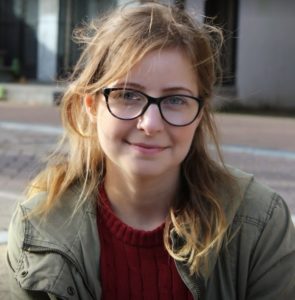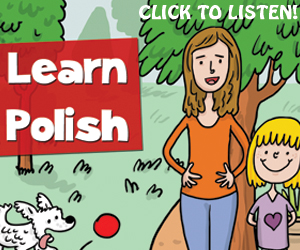Beata Borzecka used to be a barista. Now she works for Europe’s largest family-run car company. In an interview with Brin Best she shares her experience illustrating the transition that many Poles in the UK undergo, as they improve their English to match their Polish university education and fulfil their ambition.
What was your childhood like in Poland?
 “I was brought up in Braniewo in north-eastern Poland, a short distance away from the border with the Russian exclave of Kaliningrad Oblast. My mum had me when she was very young and then had my sister soon afterwards, so I spent a lot of time with my grandparents, especially my granny. Plus my other granddad and my auntie lived nearby, which was great as I really loved them. My grandparents lived in a cottage deep in the woods near Mingajny, about 20 miles from Braniewo in the Warmian and Masurian Lake District. They had a small farm and my granddad worked in the forest as a ranger. Their cottage was very rustic – it was miles from the nearest shop and didn’t even have an inside bathroom and toilet. When my granddad died when I was seven my granny took care of the farm herself. We had many animals including cows, pigs and chickens. I remember once being shown a boxful of beautiful fluffy chicks and I wanted to cuddle them all! I will never forget that. I also have fond memories of playing with my grandparents’ two dogs and making obwarzanki (a type of ring-shaped doughnut). This was an idyllic place for a child to spend time, and I was surrounded by wildlife such as deer, snakes and many types of birds. As a child
“I was brought up in Braniewo in north-eastern Poland, a short distance away from the border with the Russian exclave of Kaliningrad Oblast. My mum had me when she was very young and then had my sister soon afterwards, so I spent a lot of time with my grandparents, especially my granny. Plus my other granddad and my auntie lived nearby, which was great as I really loved them. My grandparents lived in a cottage deep in the woods near Mingajny, about 20 miles from Braniewo in the Warmian and Masurian Lake District. They had a small farm and my granddad worked in the forest as a ranger. Their cottage was very rustic – it was miles from the nearest shop and didn’t even have an inside bathroom and toilet. When my granddad died when I was seven my granny took care of the farm herself. We had many animals including cows, pigs and chickens. I remember once being shown a boxful of beautiful fluffy chicks and I wanted to cuddle them all! I will never forget that. I also have fond memories of playing with my grandparents’ two dogs and making obwarzanki (a type of ring-shaped doughnut). This was an idyllic place for a child to spend time, and I was surrounded by wildlife such as deer, snakes and many types of birds. As a child
I loved to go mushroom, blueberry and wild strawberry picking with my family; it became our tradition.
I even once sold some freshly picked blueberries to a local restaurant to earn some pocket money! My granddad had a tractor and I used to ride on a little seat next to him as he did his work. One day, when travelling in the area in our family car, we ran into a huge moose which was crossing the road! I also enjoyed spending time with my other granddad, who lived nearby. He was a very intelligent man and used to read lots of books. His job was to help supervise a state-owned farm. I have very happy memories of this time and it helped me to appreciate what life is like for poorer families, and of course to appreciate nature .”
How did you find school in Poland?
“I went to school in the village of Świątki, where my parents still live. I had a very enquiring mind as a child and used to find lots of difficult questions to answer! At school my favourite subjects were history and geography, and I had a great history teacher who really engaged me and made me think. I especially remember the summers being amazing during my school years, and spending lots of time outdoors.
I did, however, find it hard to engage in many aspects of school. I was a somewhat bored and disaffected student and I didn’t achieve my potential in many areas. All that changed when I was 11 years old, when my granny offered me a 200 złoty reward if I did well at school. That year I came top of the class!
I progressed into secondary school and this is where I had my first contact with the English language, though I also learnt Russian and German. My studies became more academic and my parents were strict, so my creative activities unfortunately stopped. In terms of early ambitions, I always wanted to be a fashion designer and used to spend loads of time out of school designing dresses and doing all sorts of other creative things. My mum was a tailor, so this helped to inspire me. As a child we used to spend lots of time together buying fabrics and making clothes together. I had the best clothes in my class as they were so original – designed and made by my mum and I! I also loved to talk to people about ideas when I was young – and still do.”
What was the next big step for you?
“I chose to combine part-time study at university with a job in a tax office. I studied journalism at the weekend at the University of Computer Sciences and Economics in Olsztyn, about 20 miles from my home village of Świątki. I met so many new people there. However, I soon realised that I didn’t like the pressure and values of journalism and it would not be my chosen career. Nevertheless, I was determined to complete the course, which I did in 2011.”
Why did you decide to move to the UK?
“I met my boyfriend (now fiancé) and we decided to move abroad together to sample a different way of life. We initially thought of Denmark, as we wanted to live in an open-minded country which wasn’t dominated by religion. Then, we thought of the UK, as my fiancé is a financial specialist and there are many important financial centres in the UK such as Leeds, where we eventually ended up.”
How did you find the UK?
“We arrived at Leeds Bradford Airport in the summer 2013 with our luggage (one bag full of food thanks to our mums!), mobile phones and brains and everything was exciting! And the people were friendly too – it felt good here, I liked it. We found somewhere cheap to live straight away and I managed to get my first job after two months, working in a warehouse. The next part of our plan was to improve our English, and our English accent. We found a tutor online who we worked with face-to-face, and he really helped us to become more fluent. We wanted to be part of society here and to do something positive, and we knew better English skills would help with this. I found work as a barista in a coffee shop in Leeds, and this enabled me to use my communication skills. I also had the chance to complete several qualifications through the company, such as English, maths and sales skills. I progressed really well in this role and eventually won the Barista of the Year competition in Leeds in 2016!”
What is your current job?
“In 2017 I decided to take on a new challenge and began looking for office work. I found a job at Europe’s largest family-run car company. I work as a sales administrator and find this very rewarding, and a different environment to coffee shop work. It’s less intense, I work with lots of young people and it was certainly a good move for me. My work includes ordering and registering new cars, arranging finance agreements and organising the transfer of cars across the country.”
What would your ideal job be?
“I would like to progress to become a senior sales administrator as I think I would be suited to this work; I like to be really organised.
I also want to carry out some charity work, as I’m really interested in helping people to be ‘free’.”
What do you like to do outside work?
“I enjoy reading books, including books on psychology by British authors, and also love film. I’ve attended the Leeds International Film Festival in special locations such as the iconic Hyde Park cinema. My fiancé and I also love to visit the Yorkshire countryside, such as the beautiful Bolton Abbey area, and we travel to European cities as much as we can. We also have a group of close friends in Leeds who we see socially on a regular basis.”
Have you ever experienced any discrimination or negative comments?
“No – happily people have always been kind to me. I’ve never experienced racism here.”
What is your contribution to the UK?
“I try to use Polish values in a positive way, especially warmth, honesty and hard work. I want to show people that we can live together in harmony. I love to communicate with people and exchange ideas and I correspond with a British friend who used to come into the coffee shop where
I worked. He was always fascinated by history and used to bring a book with him into the coffee shop. He’s in his late 50s or early 60s and I think he was a little lonely. We discuss history and many other things in our emails; it’s nice to have this contact and to reach out to someone in this way.”
***
 This interview was carried out as part of the ‘Poles in the UK’ project, and is linked to the book Poles in the UK: A Story of Friendship and Cooperation (by Brin Best & Maria Helena Żukowska, 2016).
This interview was carried out as part of the ‘Poles in the UK’ project, and is linked to the book Poles in the UK: A Story of Friendship and Cooperation (by Brin Best & Maria Helena Żukowska, 2016).
For more details, and to download
a free eBook PDF version of the book, visit: www.polesintheuk.net.










![Czy to możliwe? Laxton Hall po raz szesnasty! [ZDJĘCIA]](https://www.tydzien.co.uk/wp-content/themes/LondonLive/thumb.php?src=/media/2024/06/Głowne-zdjęcie-do-artykułu-nr-3-600x400.jpg&w=95&h=74&zc=1&q=100)



